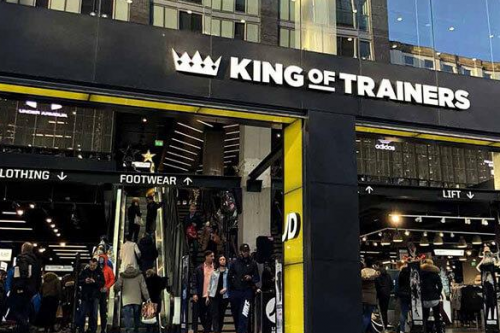Bury group tops best performing listed companies of 2019

Bury-based sports and leisurewear retailer JD Sports was the best performing stock on the FTSE-100 during the year.
Research shows that the group attained a 130% increase in its share price over the 12 month period, well ahead of second-placed AVEVA, the Cambridge-based information technology group that saw its share value improve by 94.8%.
During the year the FTSE-100 showed a gain of 17.2% in total.
The top 10 performing stocks were: JD Sports, Aveva, London Stock Exchange, Next, Barratt Developments, Halma, Taylor Wimpey, Ocado, SEGRO, Persimmon.
Russ Mould, investment director at Manchester investment platform AJ Bell, said: “The two best performers across the whole of 2019 actually began the year in the FTSE 250.
“JD Sports and AVEVA both achieved promotion to the FTSE 100 for the first time in their history in June.
“Both the retailer and the engineering software specialist continued to generate strong underlying growth, with the additional benefits of select merger and acquisition activity on top.
“This helped the firms to stand out at a time when consistent corporate earnings growth was still relatively hard to come by, thanks to a mixed global economy and ongoing concerns over trade and tariffs.”
“The London Stock Exchange’s share price got a boost from a bid that the firm successfully fended off. The latest of a long string in such episodes, added to solid operational results that defied a UK market that was pretty quiet on the new flotation front, served to remind investors of the company’s strong competitive position and how its business has shifted toward less volatile areas such as information provision and after-market activity.
“Next proved that retailers can thrive if they offer the right product, at the right price point and in the multi-channel format that suits consumers best.
“Ocado’s plan to transform itself into a software play, via global licensing deals and the part sale of its food retailing arm to Marks & Spencer, kept that stock in favour, while SEGRO’s status as a warehousing and e-commerce real estate play provided plenty of support to the real estate investment trust’s shares.
“A trio of housebuilders also features in the top 10. Their net cash balance sheets and ongoing programmes to return cash to shareholders via dividends or share buybacks, or even both, generated interest, especially as their yields stood out in a low-interest-rate world.
“Promises from Prime Minister Boris Johnson to revisit stamp duty land tax in the run-up to the December election also boosted sentiment.”
WThe 10 worst performers of the year were: NMC Health (-34.5%), Fresnillo, Pearson, Centrica, Imperial Brands, Rolls-Royce, Glencore, Hiscox, BT, Bunzl.
Alex Bell said: “A dividend cut at Centrica, fears of one at BT and the abandonment of a plan to increase its shareholder distribution by 10% a year at Imperial Brands hurt all three to varying degrees.
“At least British Gas-owner Centrica and BT were able to shake off fears over what a Labour government would have meant for them in terms of nationalisation.
“Both still face fierce regulatory scrutiny and equally fierce competition and neither company has yet to fully convince investors that their investments in new services will compensate for the pressure on their established, core operations.
“Imperial Tobacco’s substantial investment in vaping technology faces similar questions amid a regulatory inquiry in the USA.”
He added: “Disappointing results owing to losses suffered during the hurricane season and operational miscues weighed on Lloyds of London insurer Hiscox and silver miner Fresnillo. Both now face demotion to the FTSE 250 at the end of the month as a result.
“Soft commodity prices, a Serious Fraud Office investigation and the prospect of a changing of the managerial guard soured sentiment toward Glencore, while Rolls-Royce’s failure to draw a line under technical problems with the Trent 1000 engine weighed heavily on its shares.”
He said: “A September profit warning from Pearson meant that the educational publisher once more tested the patience of its shareholders. This was the latest in a string of trading alerts from the company, which faces two deep-rooted challenges.
“First, sales of printed books are falling faster than thought, as students rely on second-hand tomes or digital versions, to cut their outgoings. Second, Pearson appears to be losing share in the digital market.
“Both of these developments compound the threat of Open Education Resources (OER), whereby universities make best-of-breed lecturing and educational materials freely available, so other students and lecturers can copy, use, append and even modify the documents, and cut down on the expense of buying or renting the sort of textbooks provided by publishers such as Pearson.”




